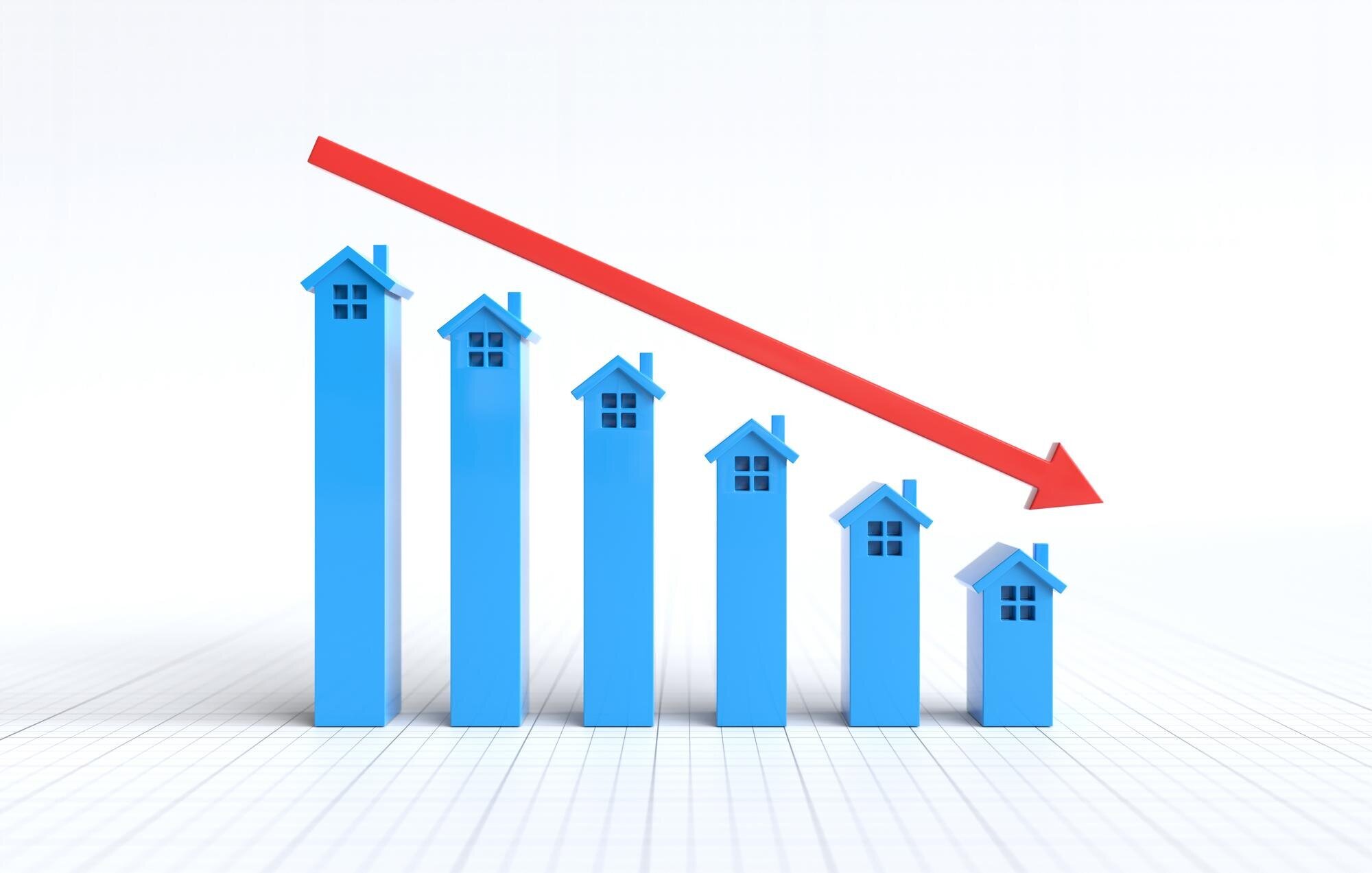Recessions are an expected part of the economic cycle, helping to correct imbalances while encouraging future economic growth. Sometimes, recessions may negatively affect home prices, making it more difficult for consumers to buy or sell. Flexible monthly mortgage payments may change, and retail sales often plummet.
Homeowners must understand what happens to home prices during a recession to prepare to sell or deal with mortgage lenders based on local market conditions. This guide reviews recessions, including how they impact the housing market and what factors may influence the severity of their impact.
It also reviews historical trends of previous recessions, how they impacted the housing market, and how sellers can still offload their homes, even in a recession.
What is a Recession?
A recession is an economic condition with at least two consecutive quarters of declining gross domestic product (GDP). Recessions typically include increased unemployment rates, decreased household spending, fewer business investments, and more defaulted loans.
The economic downturn of a recession has had many negative impacts on the economy, including the real estate market. It may also affect stock markets, industrial production rates, and the global economy.
How Recessions Affect the Housing Market
Economic uncertainty impacts the housing markets in many ways, including the following:
- Decreased Demand in Housing: Housing demand decreases during a recession, making it more difficult for sellers to offload their homes, even when they need to relocate.
- Short Sales or Foreclosure: Short sales and foreclosures are more common in recessions, as the lower house prices can make it challenging to pay off a mortgage loan through selling.
- Increases Inventory: Fewer sales mean more housing inventory. Sellers who receive offers are more likely to receive lower prices. Landlords may have more vacancies, resulting in less rental income.
- Reducing Pricing: Fewer qualified buyers also lead to lower prices, with many homes selling below the initial asking price. Central banks try to combat inflation during this time, but that doesn’t immediately help prices recover.
Factors Influencing House Prices During a Recession
Many factors can affect the real estate market during a recession, including the following.
Severity and Duration of the Recession
Recessions can be short and fast or long and severe, lasting several years. The severity and duration of the economic downturn will significantly affect how much and how long it influences the housing market. The impacts of a recession on the housing market can take some time, and if the recession is short, it’s unlikely to impact it as much.
Local Market Conditions
Local market conditions can also impact real estate during a recession. Some real estate markets, especially those with lower employment rates or higher-priced homes, may be more greatly affected. Additionally, defaults on vacation and investment properties usually occur first, leading to markets with a high rate of these being impacted more quickly.
Government Policies and Interest Rates
Government policies, specifically how they influence interest rates, also directly affect the impact of a recession on the real estate industry. Higher interest rates lead to fewer buyers since housing costs more. Rising mortgage rates also mean buyers have less to spend, which can further affect economic activity.
The Federal Reserve sets interest rates, which has an important impact on the economy. How the Fed responds to a recession and how quickly it does so can also influence how long the recession’s effect lasts.
For example, lowered interest rates can create more buyer demand, helping to strengthen a weak economy. Higher mortgage rates can help control buyer demand and lower real estate prices.
Specific policies, such as stimulus packages, can also help protect the real estate market from these recession fluctuations. States or cities implementing foreclosure prevention programs can also help minimize a recession’s impact on the housing market. Too many foreclosures bring down property values, greatly impacting the local markets.
Consumer Confidence
Consumer confidence is also important to consider in terms of a recession and housing market trends. Less-than-confident consumers can use their buying power to shift a minor recession into a more significant one. The Consumer Confidence Index (CCI) regularly measures the overall confidence level of buyers.
Historical Trends in House Prices During Recessions
Reviewing previous recessions throughout history can help predict the expected impacts. The United States has undergone numerous recessions. The most recent was the COVID-19 recession due to the global pandemic. This unique recession increased the demand for housing, leading to higher prices and low inventory.
However, this didn’t follow traditional recession patterns, as various federal government programs were in place to avoid an economic slump. Instead, it led to increasing home values and a more competitive market.
The Great Recession of 2007-2009 had a major effect on the housing market, leading to a sharp decline in home prices and a record number of foreclosures. Some markets, including cities in Florida, Arizona, Nevada, and California, experienced more economic turmoil than others.
The Great Recession was caused by a housing bubble burst. Rising unemployment made it difficult for homeowners to make their mortgage payments, eventually leading to an influx of defaulted mortgage loans.
Before this, the U.S. experienced many recessions, including the early 2000s and 1900s. Most historical recessions have been preceded by negative growth, high consumer price index (CPI), rising home prices, and job losses. However, the financial crisis eventually balances itself out, and the economy recovers.
Ongoing economic research continues to identify trends, including how long recessionary periods last and how they can be prevented or better controlled. Some downward pressure on home prices can be useful, but too much for too long can greatly impact the housing market.
What to Expect in a Recessionary Real Estate Market
Economic recessions are normal in the U.S. economy. Knowing what to expect, including how a recession may impact the housing market going forward and how to price a house for sale, can help homeowners prepare.
Potential for Price Declines
It’s important to note that not all recessions impact the real estate market. The impact may also not always be significant, even among the ones influencing home prices and demand. Some economic decline is usually expected during a recession, which translates to lower home prices.
However, prices eventually recover. The length of the recovery may depend on the local market and current market trends. Different asset classes may also recover on different timelines.
Longer Time to Sell
It may also take longer to sell a house during a recession. Fewer buyers due to a lack of confidence mean homes may sit on the market longer. Reduced demand also means fewer home offers, which means the seller may have to accept a lower price or more contingencies to sell. Selling a house during a recession usually requires patience and flexibility.
Increased Foreclosures and Short Sales
Short sales and foreclosures are also more likely during a recession. Some sellers may be underwater, meaning they owe more to their existing mortgage loan than its current value. This can lead to economic hardship that leaves the seller with few options. If they sell, they may have to spend money out of pocket to pay off the balance.
Sellers have a few options when selling during a recession, including a short sale, foreclosure, or selling to a cash house buyer. While some sellers may want to wait for the recession, this may not be an option for everyone. Homeowners may need to sell for career relocation, upgrading or downsizing, or following the inheritance of real estate.
Short sales are voluntary sales that allow the seller to sell for less than what they owe, whereas foreclosures are involuntary sales by the lender. Both short sales and foreclosures negatively impact the local economy and influence home prices.
A cash buyer may be an option for buyers seeking to offload quickly. If you’re considering a short sale, it’s important to understand the process and how long a short sale takes.
Challenges of Selling Your House During Recession
Sellers may find it more difficult to sell during a recession. Rising interest rates or a break in consumer spending leads to fewer buyers. Fewer buyers means fewer offers, often leading to the seller selling for less than they want and with more contingencies. Lower property values can also affect appraisals, which could lead to more deals falling through.
Benefits of Selling to a Cash Home Buyer
Selling to a cash buyer may be a great solution during a recession. Cash buyers allow sellers to skip contingencies, including appraisals and inspections.
It also allows sellers to offload their properties without completing expensive repairs or renovations. In return, sellers can trade their monthly mortgage and interest payments for a better financial situation.
As the economy slows, sellers lose options for selling their homes for a fair price. Real estate investors may attempt to purchase, but many focus on paying as little as possible.
Cash sales are a good deal because of the reduced selling costs. Sellers can avoid expensive contingencies and real estate fees. They also don’t have to worry about increasing mortgage rates impacting buyer eligibility. Finally, the seller controls the sale, including the closing date.Contact A-List Properties at (972) 526-7042 to sell your home for cash. Use our online form to receive a fast cash offer.

Zach Shelley
Zach Shelley is a seasoned real estate investor with a diverse network spanning across the nation. As the founder of his own real estate venture, Zach is committed to offering innovative solutions to homeowners facing various real estate challenges.. Through his dedication and strategic approach, Zach continues to make a significant impact in the real estate industry, providing homeowners with alternative pathways to navigate their property transactions.



